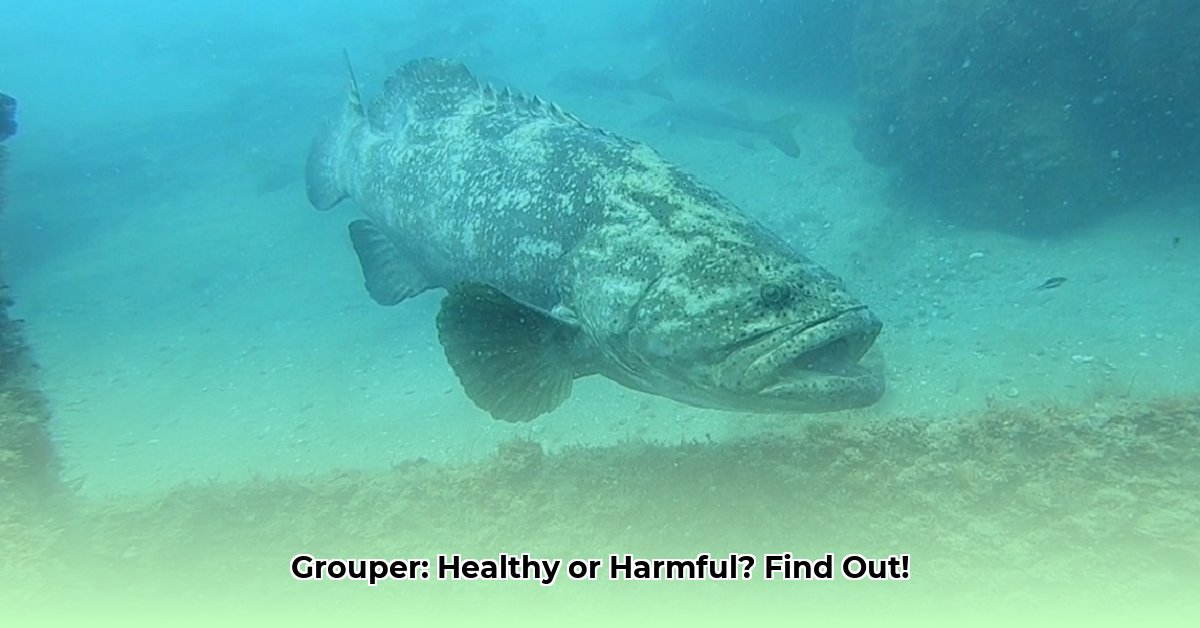Grouper: a culinary delight or a health hazard? The answer, like the ocean it inhabits, is complex. This comprehensive guide navigates the often-murky waters of seafood consumption, addressing concerns about mercury levels, ciguatera poisoning, and overfishing. For more in-depth information, check out this helpful guide. With clear, actionable information, you’ll learn how to make informed decisions, savor the flavors of grouper, and safeguard both your health and the marine environment.
Unveiling Grouper’s Nutritional Profile and Health Benefits
Grouper isn’t just delicious; it’s a nutritional powerhouse. Packed with lean protein, it plays a vital role in tissue repair, muscle growth, and maintaining healthy skin. The presence of heart-healthy omega-3 fatty acids contributes to cardiovascular well-being and supports cognitive function. Furthermore, grouper delivers essential vitamins and minerals, adding to its overall health benefits.
Navigating the Potential Risks of Grouper Consumption
While grouper boasts numerous advantages, it’s essential to be aware of potential risks. Mercury contamination, ciguatera poisoning, and sustainability concerns are factors that demand careful consideration.
Mercury Contamination: Understanding the Silent Threat
Mercury, a naturally occurring heavy metal, accumulates in aquatic ecosystems and, consequently, in fish. Larger, longer-lived predatory fish like grouper tend to have higher mercury concentrations. Consuming excessive amounts of mercury can pose health risks, particularly for pregnant women, nursing mothers, and young children, affecting neurological development. Fish from industrial waters can often lead to higher mercury levels in fish due to pollution. It’s important to note that mercury levels can vary significantly depending on species.
Ciguatera Poisoning: A Regional Threat to Seafood Safety
Ciguatera poisoning is a foodborne illness caused by consuming fish contaminated with ciguatoxins. These toxins are produced by certain marine algae and accumulate in reef fish, including grouper, through the food chain. Ciguatera is more prevalent in tropical and subtropical regions, making the origin of your fish a critical factor in assessing risk. Certain areas, particularly in the Caribbean, South Pacific, and parts of Florida, are known to have higher rates of ciguatera.
Sustainability: Making Responsible Seafood Choices
Overfishing poses a significant threat to grouper populations and the delicate balance of marine ecosystems. Unsustainable fishing practices can deplete fish stocks, disrupt food webs, and damage habitats. Choosing sustainably sourced grouper is crucial for protecting marine biodiversity and ensuring the long-term availability of this valuable resource.
Key Factors Influencing Grouper Safety and Quality
Several interconnected factors determine the safety and quality of grouper:
- Size Matters: Smaller grouper generally have lower mercury levels. Opting for smaller portions can significantly reduce your exposure to this contaminant.
- Geographic Origin: The location where the grouper was caught plays a crucial role. Water quality, industrial activity, and fishing regulations vary by region, influencing the levels of contaminants and the sustainability of fishing practices.
- Farmed vs. Wild-Caught: Both farmed and wild-caught grouper have their own set of considerations. Farmed grouper may have lower mercury levels but could be raised in environments with other potential contaminants or antibiotic use. Wild-caught grouper’s mercury levels depend on their diet and the environmental conditions of their habitat.
- Species-Specific Risks: Different grouper species exhibit varying levels of mercury accumulation and susceptibility to ciguatera. Goliath and Warsaw groupers, being larger and longer-lived, typically have higher mercury concentrations and should generally be avoided.
Practical Guidelines for Safe Grouper Consumption
Follow these guidelines to enjoy grouper while minimizing potential risks:
- Consult Government Advisories: Regularly check the FDA and EPA websites for the latest advisories on mercury levels in fish and region-specific guidance. Pay close attention to recommendations for pregnant women, nursing mothers, and young children.
- Choose Smaller Portions: Opt for smaller grouper fillets or servings to reduce your mercury intake.
- Prioritize Sustainable Sourcing: Look for grouper certified by reputable organizations such as the Marine Stewardship Council (MSC) or the Aquaculture Stewardship Council (ASC). These certifications ensure that the fish comes from well-managed fisheries or farms that adhere to sustainable practices.
- Know Your Supplier: Purchase grouper from reputable fishmongers or restaurants that can provide information about the source of the fish and their sustainability practices.
- Embrace Seafood Variety: Don’t rely solely on grouper. Incorporate a diverse range of seafood into your diet, including lower-mercury options such as salmon, shrimp, and cod.
- Cook Thoroughly: Ensure that grouper is cooked to an internal temperature of 145°F (63°C) to eliminate harmful bacteria.
Visualizing the Risks: A Grouper Risk Assessment Table
This table provides a general overview of the risks associated with different grouper species. Keep in mind that this is a simplified guide, and actual risk levels can vary. Always consult the latest government advisories and your healthcare provider for personalized recommendations.
| Grouper Species | Mercury Risk | Ciguatera Risk | Sustainability Risk | General Recommendation |
|---|---|---|---|---|
| Red/Black Grouper | Moderate | Low to Moderate | Moderate | Consume in moderation, prioritizing sustainably sourced options. |
| Gag Grouper | Moderate | Low to Moderate | Moderate | Consume in moderation, prioritizing sustainably sourced options. |
| Scamp Grouper | Low | Low | Low | Good choice for regular consumption, prioritizing sustainably sourced options. |
| Goliath/Warsaw Grouper | High | Moderate to High | High | Avoid consumption due to high mercury levels and endangered status. |
Conclusion: Making Informed and Responsible Seafood Choices
Grouper can be a delicious and nutritious part of a balanced diet. By understanding the potential risks, following the guidelines outlined in this guide, and staying informed about sustainable seafood choices, you can enjoy grouper responsibly. Remember that variety, moderation, and informed decision-making are key to maximizing the benefits of seafood while minimizing potential risks. A balanced approach not only protects your health but also contributes to the long-term health of our oceans.
- Borosilicate Food Containers for Durable and Safe Everyday Use - January 30, 2026
- Borosilicate Glass Meal Prep Containers Offer Durable Oven-Safe Storage - January 29, 2026
- Glass Storage Bowls With Glass Lids Offer Superior Freshness - January 28, 2026










